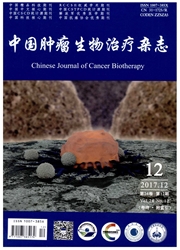

 中文摘要:
中文摘要:
目的:以放射线处理建立小鼠淋巴细胞减少症模型并探讨其免疫学意义。方法:1.25Gy放射剂量照射C57BL/6小鼠,不同时问点计数外周血、脾脏和淋巴结中免疫细胞数,FACS动态分析各淋巴细胞亚群比例改变,RT—PCR检测淋巴细胞中转录因子T—bet、GATA-3的表达。进一步以DC—gp100瘤苗免疫放射处理小鼠,B16F10黑素瘤细胞攻击,观察肿瘤生长的大小。结果:放射线处理后小鼠淋巴细胞数显著减少,CD4^+CD25^+T细胞比例明显降低;CD44^highCD62^how记忆样T淋巴细胞形成;T-bet表达明显上调,GATA-3表达无明显改变。与未照射组比较,放射处理小鼠经DC—gp100瘤苗免疫后具有增强抵抗B16F10黑素瘤细胞攻击的效应,肿瘤生长明显减缓。结论:以放射线处理成功建立淋巴细胞减少症模型,并具有增强免疫保护的效应。
 英文摘要:
英文摘要:
Objective: To establish a mouse lymphopenia model via irradiation and to study its immune characteristics. Methods: Lymphocytes isolated from PBMC, spleen and inguinal lymph-nodes were counted after C57BL/6 mice were treated with irradiation at the dosage of 1.25 Gy. Subsets of lymphocytes were analyzed by FACS. The expression of transcription factors T-bet and GATA-3 were detected by RT-PCR. Irradiated mice treated with DC-gpl00 vaccine were challenged by B16F10 tumor cells, tumor growth was observed. Results: 1.25 Gy irradiation significantly decreased the cell number of lymphocytes, specially the subset of CD4^+ CD25^+ T cells. A memory-like T subset was induced during the course of immune reconstitution. The expression of T-bet but not GATA-3 in the splenocytes was up-regulated. Irradiated mice vaccinated with DC-gp100 could resist the tumor challenge and retard the tumor growth. Condusion: Lymphopenia mouse model is successfully established and .an enhanced immune protection can be induced under the lymphopenia status.
 同期刊论文项目
同期刊论文项目
 同项目期刊论文
同项目期刊论文
 期刊信息
期刊信息
